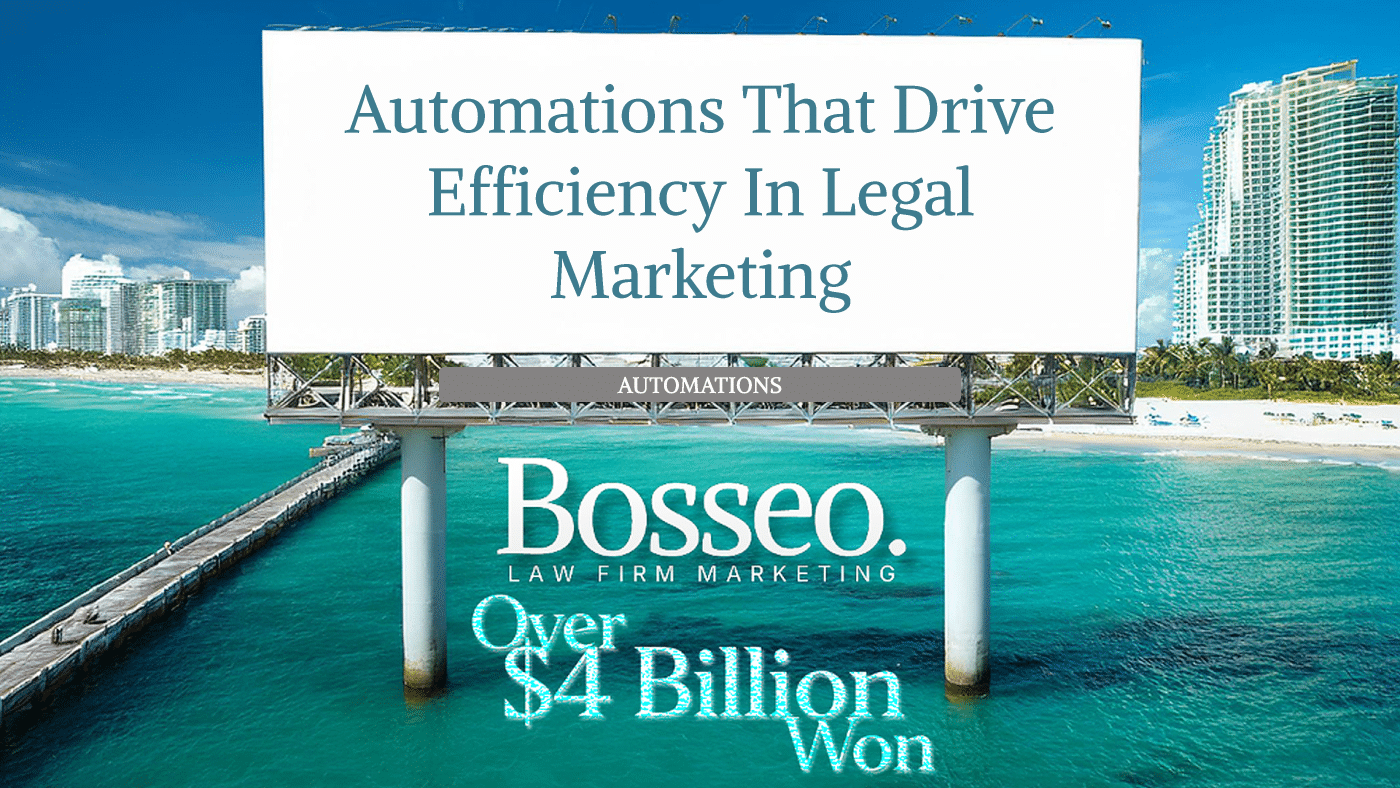How Automation Transforms Legal Marketing Efficiency
In the rapidly evolving landscape of legal marketing, automation has emerged as a pivotal tool for boosting efficiency. Law firms across the country are increasingly turning to automation technologies to streamline processes, enhance client engagement, and boost operational performance. By adopting automation tools, legal marketing teams can allocate more resources and time to strategy development and client relationship-building, leaving mundane and repetitive tasks to be handled by machines.
Automation technologies can be leveraged to achieve superior accuracy in managing data and analyzing metrics, which in return aids in crafting data-driven marketing strategies that resonate with potential clients. Moreover, these technologies assist in minimizing human errors, ensuring a more reliable and consistent output of marketing efforts. As legal firms strive to gain a competitive edge, integrating automation into their marketing strategies can be a game-changer.
The transformative power of automation in legal marketing cannot be overstated. From email marketing to social media management and client relationship management, automation touches various facets of marketing, making processes smoother and quicker. The ultimate goal is to create more effective marketing campaigns by focusing more on strategic initiatives than on operational drudgeries.
Understanding the Core of Automation in Legal Marketing
Automation involves the use of technology to perform tasks with minimal human intervention. In the context of legal marketing, it encompasses an array of tools and software designed to automate repetitive, manual tasks. This includes, but is not limited to, email marketing campaigns, social media posting schedules, client database management, and analytics reporting.
Understanding the dynamics of automation requires acknowledging its role in effectively replacing routine tasks, allowing marketing teams to concentrate on developing customized marketing strategies that appeal directly to their target audience. It is a tool to balance efficiency with creativity—a pivotal component amid the highly competitive legal services market. By automating monotonous tasks, legal marketers can delve deeper into innovative campaigns and client-focused strategies.
Legal marketing automation is not just about reducing workload; it’s about enhancing the effectiveness of a firm’s marketing output. By automating processes that do not require human creativity, legal firms free up time and resources, enabling marketing professionals to concentrate on strategic planning, client interaction, and building the law firm’s brand.
The Relevance of Automation in Today’s Legal Marketing Environment
In today’s fast-paced, digital-first world, legal marketing must adapt quickly to changing client expectations and demands. Automation has relevance because it answers the critical need for efficiency and accuracy in marketing practices. In a legal landscape where technology drives client interactions, the ability to respond promptly and effectively is vital.
Legal clients demand timely responses and relevant information, which can be facilitated through marketing automation. By automating email campaigns, scheduling content, and managing customer relationships, law firms can ensure they remain top-of-mind with their clients without constantly pulling resources away from more critical tasks. Automation allows real-time engagement, demonstrating the firm’s commitment to communication and service excellence.
Furthermore, automation brings data-driven insights into the forefront of legal marketing strategies. By collecting and analyzing data, legal firms can gain a competitive edge, helping them make informed decisions on where to allocate their marketing budgets and efforts. This, in turn, enhances the return on investment, positioning the law firm as a proactive, metrics-guided entity that clients can trust.
The Automation Framework for Efficient Legal Marketing
Implementing an effective automation framework within legal marketing starts with the integration of sophisticated tools and solutions tailored to address specific marketing needs. This framework encompasses everything from automated client intake and follow-up systems to analytics dashboards that provide insights into campaign performance and client engagement metrics.
One aspect of this framework is the CRM (Customer Relationship Management) systems equipped with automation capabilities. They enable legal firms to track and analyze client interactions, ensuring personalized and timely follow-ups. Such systems not only aid in nurturing client relationships but also help align marketing efforts with client needs, thereby enhancing satisfaction and retention.
Social media automation tools also form an integral part of this framework. They allow for the scheduling and automatic posting of content across various platforms, ensuring consistency and maximizing reach. By using these tools, legal marketers can ensure that their messaging remains consistent and aligned with the firm’s overarching branding strategies, without the need for constant manual updates.
Illustrating Automation in Practice: Real-World Legal Marketing Applications
There’s no better way to grasp the impact of automation on legal marketing than by examining real-world examples. An automated email marketing campaign may be the starting point for many legal firms. By automating lead nurturing and follow-ups via pre-set email sequences, law firms can maintain constant engagement with potential clients without manual intervention, ensuring they stay top-of-mind as prospective clients navigate their decision-making journey.
Another practical application is automating appointment scheduling through AI-powered chatbots. These bots can interact with clients visiting a firm’s website, assist them in booking consultations, and provide relevant information based on client inquiries. Such automation not only enhances client experience but also optimizes the firm’s resources, allowing human staff to focus on high-value activities.
Let’s consider analytics automation, a critical component in understanding campaign effectiveness. By utilizing automated analytics dashboards, law firms receive real-time data about their marketing performance across channels, empowering them to swiftly adjust strategies based on insights. Whether shifting resources from an underperforming campaign or amplifying successful tactics, automation allows for quick, informed decision-making.
Proactive Steps to Implement Automation in Legal Marketing
Implementing automation in legal marketing starts with an introspective analysis of a firm’s marketing objectives and operational bottlenecks. Identifying where automation can provide the most value—be it in client management, content scheduling, or lead tracking—is crucial. Once these areas are pinpointed, the next step is to select technology solutions aligned with these goals, ensuring they integrate seamlessly with existing systems.
Training the marketing team on chosen automation tools is equally important. It is not just about introducing new technology; it’s about empowering the team to leverage these tools for maximum effectiveness. Proper training ensures that staff can confidently navigate new systems and use them to their full potential, leading to seamless adoption and utilization.
Staying agile and open to feedback is vital. As technology evolves, so must the marketing strategies that utilize it. Regularly reviewing automation processes and outcomes can highlight areas for improvement. By fostering a culture of continuous optimization, legal firms can ensure that their marketing automation remains effective and aligned with their evolving business goals.
Pitfalls to Avoid When Employing Automation in Legal Marketing
While automation offers significant benefits, it also poses potential challenges, which can derail efforts if not carefully managed. One common mistake is over-relying on automation without considering the personal touch that legal clients still expect. Focusing too heavily on technology can make marketing efforts seem impersonal, which can alienate potential clients who value personalized attention.
Another pitfall is failing to regularly update and review automation processes. As with any marketing strategy, stagnant automation can lead to reduced effectiveness. Regularly assessing and refreshing automated content, strategies, and tools ensures that they remain relevant, up-to-date, and in line with the latest client trends and behavioral insights.
The reliance on automation should always be balanced with human oversight to avoid errors. Even the most advanced tools can make mistakes or misinterpret data without human checks in place. It is crucial to ensure there is a balance between automated processes and direct input from marketing professionals to maintain high-quality outputs.
When Legal Firms Should Seek Professional Marketing Assistance
Navigating the world of legal marketing automation can be complex, and there are situations where engaging a professional marketing firm becomes not only beneficial but necessary. When in-house teams lack the bandwidth or technical acumen to effectively implement or manage automation tools, reaching out to a specialized marketing firm ensures that strategies are not only implemented efficiently but also strategically aligned with business objectives.
During periods of rapid growth or transition, a law firm might struggle to keep its marketing efforts aligned with its larger goals. Professional marketing firms offer the expertise to manage these growing pains, ensuring that automation is not only a tool for operational efficiency but also a driver for consistent brand messaging and enhanced client outreach.
Legal firms can also benefit from a fresh perspective brought by external marketing professionals. With their broad view of various industry strategies, marketing professionals can provide insights and innovative solutions that internal teams might overlook. This infusion of new ideas coupled with automation can invigorate a firm’s marketing strategy, driving it toward unprecedented success.
Exploring the Advantages of Engaging a Marketing Firm for Legal Automation
Engaging a professional marketing company brings numerous advantages, particularly in the realm of automation. Such firms are adept in the latest automation technologies and trends, offering clients cutting-edge strategies tailored to their specific needs. With extensive experience across various marketing platforms, these companies can seamlessly integrate automation into existing systems, ensuring minimal disruption and maximum efficacy.
Cost efficiency is another key benefit. Investing in a marketing firm can often prove more economical than attempting to build an in-house team with automation specialization. A professional agency offers scalable solutions that can be tailored to the firm’s size and marketing needs, allowing for greater flexibility without the overhead costs associated with hiring and training additional staff.
Furthermore, professional marketing firms bring a wealth of industry insights and strategies honed through working with diverse clients. This comprehensive knowledge expands the realm of possibilities for legal firms, as they can leverage proven tactics and learn from others’ successes, ultimately optimizing their automation process to outperform competitors.
Partnering with Bosseo for Legal Marketing Automation Success
Bosseo stands as a leading choice for law firms seeking to enhance their marketing automation strategies. With a proven track record of delivering tailored marketing solutions to legal professionals nationwide, Bosseo excels in understanding the unique demands of the legal sector and crafting strategies that cater to these specific needs. Their strategic approach goes beyond mere technology deployment, focusing on aligning automation with the firm’s overarching business objectives.
What sets Bosseo apart is their commitment to ensuring that automation serves as a tool for human creativity rather than a replacement for it. They emphasize maintaining the critical personal touch that legal clients desire while leveraging automation for operational precision and engagement consistency. This dual approach enables their clients to benefit from the best of both worlds: efficient processes and personalized client interactions.
Bosseo continuously adapts its strategies to incorporate the latest trends and technologies in the field of legal marketing. By tapping into Bosseo’s expertise, legal firms can not only implement and manage automation tools effectively but also benefit from ongoing support and strategy refinement, ensuring that their marketing efforts remain competitive, effective, and innovative.



![Improved Signup Flow in [https://affiliates.gohighlevel.com]. Now Supports 3D Secure (3DS) Authentication for Cards (Especially for Indian Users!) - Bosseo CRM](https://bosseo.com/wp-content/uploads/2025/06/affiliates.gohighlevel.com_.Now-Supports-3D-Secure-3DS-Authentication-for-Cards-Especially-for-Indian-Users.png)
